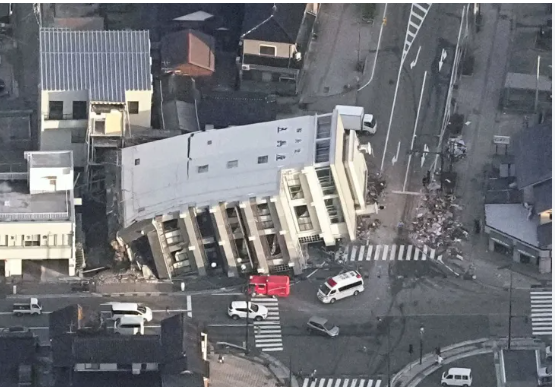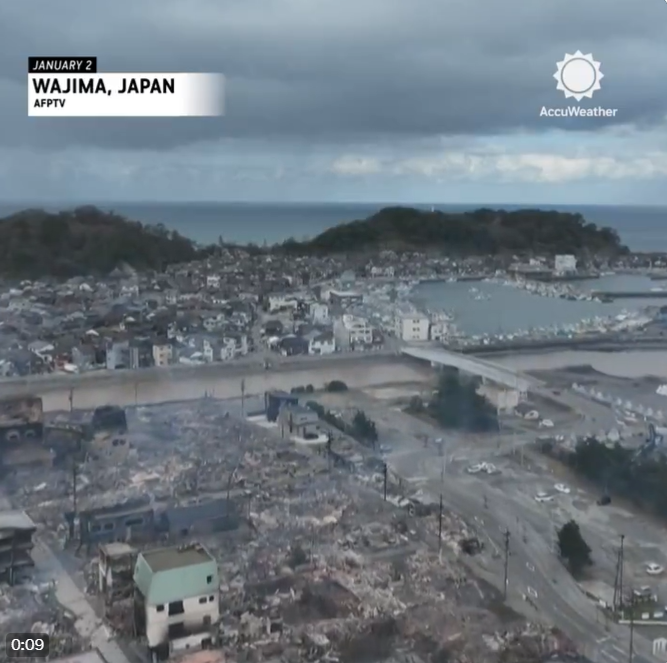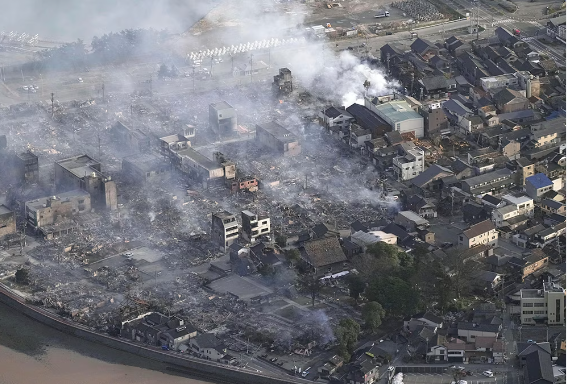
Japan Earthquake Claims 62 Lives, Rescuers Confront Aftershocks Amid Harsh Weather Conditions
Japan Earthquake Toll Hits 62, Rescuers Struggle Amidst Collapsed Buildings and Adverse Conditions”
In the wake of a series of powerful earthquakes, including one registering a magnitude of 7.5, the toll in Japan has surged to 62, with over 20 people reported to be seriously injured. Grimly, many individuals are still feared trapped beneath the wreckage of collapsed buildings, particularly in the hard-hit Ishikawa prefecture, notably in Wajima and Suzu on the Noto Peninsula.

As authorities work tirelessly to confirm the number of missing individuals, reports indicate that a significant portion of the casualties occurred in areas where buildings crumbled under the force of the earthquakes. The Noto Peninsula in the central prefecture of Ishikawa bore the brunt of the devastation on Monday, prompting tsunami warnings as far away as eastern Russia.
Rescue efforts faced additional challenges on Tuesday as aftershocks continued to jolt the region, and poor weather conditions hampered the search for survivors amidst the rubble. The Japan Meteorological Agency (JMA) issued warnings of heavy rainfall in Noto, cautioning against the heightened risk of landslides until Wednesday evening.
Tragically, the rescue and relief mission suffered a setback when an aircraft carrying emergency supplies caught fire following a runway collision at Haneda airport, resulting in the loss of five coastguard crew members.
Prime Minister Fumio Kishida emphasized the urgency of the situation on Tuesday night, acknowledging that time is of the essence in rescuing individuals trapped in collapsed structures. The government, led by Kishida, plans to convene an emergency task force meeting on Wednesday morning to strategize relief and rescue operations.
In Suzu, a coastal city severely affected by the earthquakes, Mayor Masuhiro Izumiya painted a dire picture, stating that “almost no houses [are] standing.” According to him, approximately 90% of the town’s houses are either completely or almost entirely destroyed, depicting a catastrophic situation.
While Japan frequently experiences earthquakes, with most causing minimal damage, the recent events have brought a harsh reminder of the nation’s vulnerability. The haunting memory of the 2011 undersea quake and tsunami disaster, claiming around 18,500 lives, adds to the collective grief and challenges faced by the resilient island nation.
As rescue operations intensify and the affected regions begin the process of recovery, there is a pressing need for humanitarian aid to reach those grappling with the aftermath of the earthquakes. Emergency shelters, medical supplies, and sustenance are crucial in the immediate phase, ensuring that displaced individuals receive the care and support required.
The widespread destruction of homes and infrastructure demands a comprehensive reconstruction plan. The task at hand involves not only rebuilding physical structures but also restoring communities, addressing trauma, and providing resources for long-term rehabilitation.
International organizations, neighboring countries, and relief agencies are mobilizing resources to extend a helping hand to Japan. Collaborative efforts will be essential in addressing the multifaceted challenges posed by the earthquake, from immediate rescue operations to long-term recovery initiatives.
One of the lessons learned from previous disasters is the importance of community resilience and preparedness. The Japanese people’s ability to come together, support one another, and implement effective disaster response strategies will be key in navigating the recovery process.

The government’s commitment to transparency and clear communication with the affected population is paramount. Keeping the public informed about ongoing efforts, safety measures, and available support services fosters a sense of solidarity and helps in managing expectations during these challenging times.
In parallel, the global community’s support through financial contributions, logistical aid, and expertise will significantly impact the pace and success of Japan’s recovery. The international response underscores the interconnectedness of nations in the face of natural disasters, emphasizing the importance of collective action to address shared challenges.
As the immediate crisis subsides, attention will turn to implementing measures that enhance Japan’s resilience against future seismic events. This may involve improved infrastructure, early warning systems, and community-based initiatives that empower individuals to respond effectively in times of crisis.
While the scars of this earthquake will undoubtedly linger, Japan’s determination to rebuild, coupled with global solidarity, will contribute to the nation’s recovery and reaffirm the strength of the human spirit in the face of adversity. The days ahead will be challenging, but with concerted efforts and unwavering support, a brighter future awaits the resilient people of Japan.
For the latest updates-click here.


